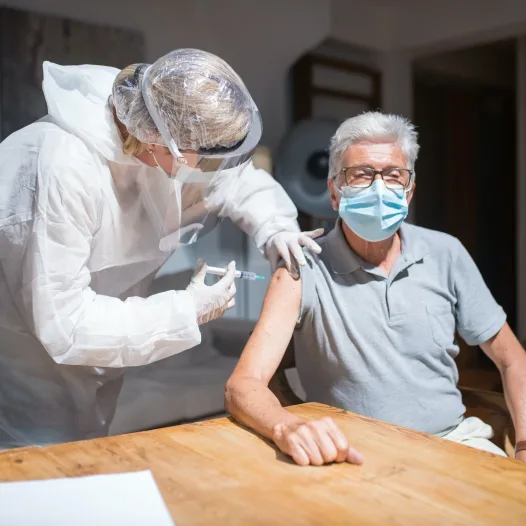Start
February 27, 2023
End
March 3, 2023
Address
La Paz, Bolivia View mapBackground:
Flu pandemics are recurring events that pose a major threat to global health security due to their unpredictability and potentially devastating consequences for health and economies around the world. The ongoing COVID-19 pandemic, as well as the 2009 H1N1 influenza A pandemic, revealed best practices and gaps in pandemic preparedness activities, including in areas of pandemic vaccine deployment and public acceptance of vaccination. Ensuring effective and efficient deployment of pandemic supplies, including vaccines, is particularly critical, as vaccination is often the main intervention to reduce disease-associated morbidity and mortality. Delays or failure to ensure availability, access, and distribution of pandemic vaccines can have dire consequences for populations in need.
As part of its capacity building efforts in this area, WHO is supporting the development and regular review of global and national plans for the deployment of pandemic products, which are critical documents needed to access WHO-assured vaccine. The response efforts to COVID-19 are an optimal space to now involve countries in the adaptation and development of national deployment and vaccination plans for respiratory viruses.
Objectives:
- Carry out the pandemic influenza vaccine mobilization table simulation exercise.
- Identify the lessons learned about the deployment and vaccination against influenza and covid-19 in Bolivia.
- Create a roadmap to update the national deployment and vaccination plan against pandemic influenza and other respiratory viruses.
Expected results:
- To obtain a greater understanding of the importance of vaccine rollout planning, including essential components of national rollout and vaccination plans against pandemic influenza and other respiratory viruses;
- To move forward with the draft of the Bolivian National Deployment and Vaccination Plan against pandemic influenza and other respiratory viruses and define the steps to finalize it and address the activities identified to strengthen preparedness;
- To identify best practices from the COVID-19 experience, to achieve readiness in the various areas of deployment (for example, regulatory capacity, human resources and security, supply chain management, etc.):
- To become familiar with WHO tools to support the development and updating of national deployment and vaccination plans for pandemic influenza and other respiratory viruses.
Work methodology:
The workshop will include a tabletop exercise (game), educational presentations and group work activities that will allow participants to identify weaknesses in vaccine deployment planning and the application of tools to enable the revision or development of Bolivia’s NDVP; and subsequently based on the lessons identified and the forthcoming WHO Guidance on Developing and Implementing a National Deployment and Vaccination Plan for Vaccines Against Pandemic Influenza and Other Respiratory Viruses with Pandemic Potential, the country may develop a route to update your national deployment and vaccination plan against pandemic influenza and other respiratory viruses.
Language:
Spanish
Participants:
The participation of representatives of the national level is anticipated with a maximum of approximately 75 professionals responsible for:
- pandemic coordination and response and emergency operation center (incident managers) and their counterparts;
- the preparation and response to pandemics of the Ministry of Health and other government agencies;
- the national Expanded Program on Immunization (EPI);
- logistics and vaccination operations, including supply chain specialists, customs clearance;
- the National Regulatory Authority or National Medicines Agency to support national pandemic preparedness and response activities as key partners (eg international organizations, civil society and NGOs)
Agenda:
|
Speaker | |
| 09:00 – 09:30 | Sign in | |
| 09:30 – 09:45 | Welcome and opening remarks
Goals and expected results Administrative provisions |
PWR Bolivia |
| 09:45-10:15 | PIP framework and pandemic preparedness activities | OPS |
| 10:15-10:45 | Why planning for the pandemic flu deployment now? | OMS |
| 10:45-11:15 | Group photo and coffee break | |
| 11:15 – 12:45 | Response experience to the COVID-19 pandemic in Bolivia | Bolivia |
| 12:45-13-45 | Lunch | |
| 13:45– 14:00 | Pandemic Influenza: Leveraging Seasonal Influenza Knowledge and Infrastructure | OPS |
| 14:00- 14:15 | Influenza and OVR epidemiological surveillance situation | Bolivia |
| 14:15 – 14:45 | Regulatory pathways and capacity building for pandemic vaccine deployment | |
| 14:45- 15:15 | Active and passive surveillance: ESAVI capture | |
| 15:15-15:45 | Coffee break | |
| 15:45-16:15 | Vaccine acceptance – Risk communication, community resilience, infodemic management and scientific communication | |
| 16:15-16:30 | Closing | |
|
|
| 9:00 – 09:15 | Resumen del día 1 y apertura del día 2 |
| 09:15-09:30 | Introducción al ejercicio de mesa “Juego de despliegue de vacunas” |
| 09:15-10:30 | Misión 1: Plan Nacional de Despliegue y Vacunación (PNDV) |
| 10:30-10:45 | Pausa café |
| 10:45-12:00 | Misión 2: Planificación legal y regulatoria |
| 12:00-12:15 | Misión 3: Aceptación de la vacuna – Comunicación de riesgos, resiliencia comunitaria, gestión infodemia y comunicación científica |
| 12:15-13:15 | Lunch |
| 13:15-14:00 | Misión 3: Aceptación de la vacuna – Comunicación de riesgos, resiliencia comunitaria, gestión infodemia y comunicación científica |
| 14:00-15:00 | Misión 4: Suministro y cadena y gestión de residuos |
| 15:00-15:15 | Coffe Break |
| 15:15-16:10 | Misión 5: Sistema de vigilancia y gestión posterior al despliegue |
| 16:10-17:00 | Discusión y análisis |
| 17:00-17:15 | Closing |
|
|
| 9:00 – 09:05 | Resumen del día 2 y apertura del día 3 |
| 9:05-10:00 | Próximos pasos: hoja de ruta para la actualización del plan nacional de despliegue y vacunación contra influenza pandémica y otros virus respiratorios |
| 10:00-10:30 | Coffe break |
| 10:30-12:00 | Presentaciones grupales de brechas y próximos pasos |
| 12:00-12:30 | Resumen y conclusiones
Conclusión y próximos pasos |
| 12:30-13:30 | Lunch |



